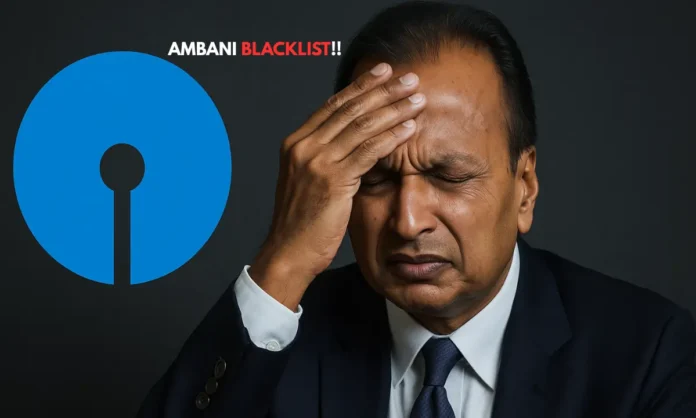Summary Box:
- SBI has classified Reliance Communications (RCom) and Anil Ambani as ‘fraud’ as per RBI guidelines.
- The bank plans to lodge a complaint with the CBI, following a declaration made on June 13.
- RCom is undergoing insolvency proceedings, while SBI has initiated a personal insolvency resolution against Ambani.
Anil Ambani Faces Fresh Setback as SBI Declares RCom ‘Fraud’
State Bank of India’s decision to classify Reliance Communications and its promoter Anil Ambani as ‘fraud’ marks another blow to the embattled businessman’s financial legacy. The move, disclosed in Parliament on Monday, comes amid longstanding insolvency proceedings against RCom, once a flagship telecom operator under Ambani’s leadership.
Minister of State for Finance Pankaj Chaudhary confirmed in a written Lok Sabha reply that SBI declared the company fraudulent on June 13, 2025, under Reserve Bank of India (RBI) directives and its internal fraud policy. The bank officially informed the RBI of this classification on June 24 and is preparing to file a formal complaint with the Central Bureau of Investigation (CBI).
RCom’s resolution professional had already informed the Bombay Stock Exchange (BSE) of the fraud classification on July 1. SBI’s exposure to RCom reportedly includes a fund-based loan worth ₹2,227.64 crore, as well as a non-fund-based bank guarantee of ₹786.52 crore.
SBI classifies #RelianceCommunications, its promoter Anil Ambani as 'fraud'; to lodge a complaint with CBI.
— NDTV Profit (@NDTVProfitIndia) July 22, 2025
Here's @sajeetkm with more details.
Read: https://t.co/vLyEhgZOBU pic.twitter.com/zKYBXwvA1t
Insolvency Proceedings and Legal Challenges
- RCom is currently under the Corporate Insolvency Resolution Process (CIRP) as per the Insolvency and Bankruptcy Code (IBC), with approval still pending from the National Company Law Tribunal (NCLT) in Mumbai.
- SBI has initiated a personal insolvency resolution process against Anil Ambani himself, underscoring the personal liability that Ambani now faces.
- The bank had earlier classified RCom and Ambani as ‘fraud’ in November 2020 and filed a complaint with the CBI in January 2021. However, a Delhi High Court status quo order stalled further proceedings.
The Supreme Court’s March 27, 2023 judgment in the SBI & Others vs Rajesh Agarwal & Others case mandates that borrowers must be given a chance to be heard before being labelled as fraudulent. This ruling has added another layer of legal scrutiny to SBI’s current action against Ambani.
Corporate Fallout and Future Implications
- The classification severely dents any prospects of revival for RCom, which has struggled to stay afloat since the telecom price wars of the mid-2010s.
- Anil Ambani’s personal finances have also come under the scanner due to his guarantees on loans taken by group companies.
- SBI’s aggressive stance highlights the banking sector’s push to hold defaulting promoters accountable, especially in high-profile cases where loan exposures run into thousands of crores.
This development could also set a precedent for how public sector banks deal with large corporate defaults in future insolvency cases. The banking community, already under pressure to reduce non-performing assets (NPAs), is expected to intensify scrutiny of high-risk borrowers.
Fraud Tag on Anil Ambani and RCom: A Defining Moment in India’s Corporate Accountability Drive
The State Bank of India’s decision to classify Reliance Communications and Anil Ambani as ‘fraud’ signals a watershed moment in India’s fight against corporate loan defaults. By moving to file a formal complaint with the CBI, SBI is reinforcing its stance on holding powerful promoters accountable for massive unpaid debts.
This action, rooted in RBI guidelines, sends a strong message to the corporate world: no borrower is beyond scrutiny, regardless of stature or political influence. For Anil Ambani, who once helmed one of India’s biggest telecom empires, this declaration is not only a reputational blow but also a legal and financial challenge that could have long-term consequences.
While RCom’s insolvency process is still underway, the fraud tag will further complicate its resolution and diminish investor confidence. Anil Ambani’s personal insolvency resolution only underscores how dire the financial crisis is for the once high-flying businessman.
On a broader scale, the move highlights a critical shift in India’s banking ecosystem — a push for transparency, compliance, and zero tolerance toward strategic defaults. As SBI awaits CBI’s involvement, the case will likely set a benchmark for similar high-profile investigations in the future.
Verdict: SBI’s bold action against Anil Ambani and RCom is not just a singular corporate scandal but a reflection of systemic reform. It marks the rise of stricter enforcement mechanisms, potentially reshaping India’s corporate lending landscape and promoter accountability in the years ahead.


